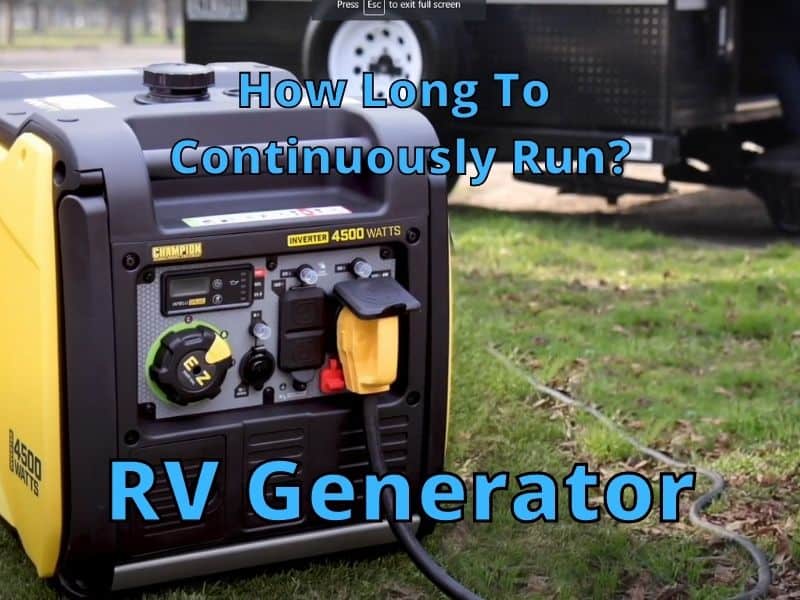An RV generator is an important item to have to charge your batteries and run electrical appliances in your RV. If you need to live out of your RV, you may need to run the generator a lot. But how long can you run it before it gets too hot or malfunctions?
Manufacturers state that RV generators should be turned off every 8 hours to check for oil levels. Most RV generators can run longer than 8 hours continuously. However, checking for safety issues such as oil levels, overloading, and overheating every 8 hours allows you to stay safe and gives you time to add fuel.
A generator can operate continuously when the temperatures are within acceptable levels and the oil is full. However, the oil will need to be checked about every 8 hours of use to ensure proper cooling, and gas needs to be replaced at regular intervals when the engine is cool.
How Long Should I Run My RV Generator?
Only run the generator for 8 hours or less for safety reasons. But, just like any engine, if everything is operating correctly, it can run for long periods. The problems start to occur when engine temperatures rise or if something happens to the oil.
Most gas generators need to be refueled every 4 to 36 hours of generator use. Refueling while a generator is in use is dangerous, so owners must wait until the engine cools before refueling.
While some gas generators may have the fuel to run longer than 8 hours, that doesn’t necessarily mean it should be run for that long.
Some propane generators can operate longer than 24 hours but should be stopped at least every 8 hours to inspect for problems; why? Below are 5 reasons.
5 Reasons To Stop A Gas Or Propane Generator Every 8 Hours
Every engine is made to specific specifications. A car engine should be checked every month to see the oil levels. Generators are different, though. All the generator manuals I’ve checked state that the oil should be checked every 8 hours or before each use.
- The Load – Generators can produce more power for short periods, and this increases engine heat. A generator that is trying to produce more electricity than it can handle will start to get hotter and hotter and damage the engine. Checking the engine temperature and load will prevent damage. (Some generators come with a load indicator)
- If the load is above 90% of its capacity, then the engine will likely start getting hotter, and if kept above 90% for too long, it may start to damage the engine.
- The Oil – The oil level needs to be fairly accurate so the generator runs well. Not low or high. Checking that the generator is level is important, so if it’s on soft ground, you should check it regularly. Each generator is different, but here are some general guidelines. (Some generators come with low oil pressure shutoff or sensors.)
- Your generator will have a break-in period where you will need to change the oil after the first 5 hours, sometimes up to 20 hours.
- You will need to change the oil every 24 or 48 hours of use.
- You will need to check the oil level every 8 hours (it seems to be standard) and before each use. (Some have low oil indicator lights)
- The Fuel – Check every 8 hours or as often as needed to know when it needs to be refilled (Each generator is a bit different). Make sure the engine is cool before adding fuel to prevent fire.
- A Level Area – Ground might shift a bit during an 8 hour period of running your generator or the generator may move a bit from vibration. Oil could leak. Finding a dry hard level area is important so that you can check correct oil levels and prevent oil from entering the wrong area of the engine. In addition, refueling is easier on level ground.
- The Weather – Check to see if the weather is effecting the operation of the generator.
- Hot areas – If your in a hot area or your generator is near something hot, it may overheat. Checking it regularly can help prevent overheating.
- Rainy areas – Your generator is producing electricity and can cause electrical problems with your RV if it is left out in the rain.
Run Times For 5 Different RV Generators
I took a look at the manuals for these five popular RV generators selling on Amazon.com. Most give very similar information about run times and how long to operate the generator before it needs to be stopped.
On all of the generators below, the instruction manuals state, you should check the engine oil levels every 8 hours. While the generators can each run longer than 8 hours depending on output levels, the standard time to stop the generator for safety is every 8 hours.
1. WEN 56380i Super Quiet 3800-Watt Portable Inverter Generator
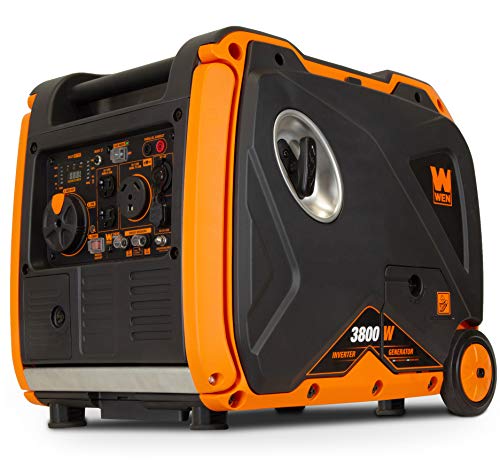
This 99 lb generator is one recommended by RV users because it is an inverter generator. Inverters tend to be quieter and safer in some ways. In addition, the inverter produces clean power, so if you’re plugging in your computer or phones into your RV outlets, there won’t be any spikes or surges, making it safer for some electronic devices.
Inverters are also better at fuel efficiency since they only produce as much power as needed by the appliances in operation in the RV.
HOURS OF OPERATION
| Check Oil | Change Oil | Add Fuel | Drain Carborator |
|---|---|---|---|
| Every 8 Hours or Daily | Every 25 Hours | Every 8 Hours or Daily | Every 8 Hours or Daily (auto shut off setting will drain carburetor for you) |
Main Product Features:
- Runtime: 8.5 hours at 50% load
- Maximum AC Output: 3,400 watts (3,800 surge)
- Parallel Ready: Yes
- Engine: 212cc 4-stroke OHV engine
- RV Ready: Yes. Has a 120V AC TT-30R Outlet
- Fuel Tank Capacity: 2.2 gallons
- Fuel Type: Gas
- Loudness: 57 decibels
- Safety: low oil pressure shutoff, auto shut off if overloaded
- Weight: 99.2 lbs
- Warranty: 2 year

2. Westinghouse Outdoor Power Equipment iGen4500
This 104 lb generator is another type of inverter generator. With its remote start, bigger gas take, and more watt handling power than the previous generator at the same weight, this might be a good one for your needs.
Because it’s fairly quiet and doesn’t produce spikes in power, you can rely on it to meet your RV needs without fear of damaging your electronic devices.
Inverters are nice because they speed up the engine as demand for electricity increases and then can slow down to a quiet, slow idle if power needs are low.

HOURS OF OPERATION
| Check Oil | Change Oil | Add Fuel | Break-In |
|---|---|---|---|
| Every 8 Hours or Before Each Use | Every 50 Hours (after 25 hours the first time) | Add Daily | First 5 Hours (Don’t exceed 50% running watts) |
Main Product Features:
- Runtime: Up to 18 hours
- Maximum AC Output: 3,700 watts (4,500 surge)
- Parallel Ready: Yes
- Engine: 224cc 4-stroke OHV engine
- RV Ready: Yes. Has a 120V AC TT-30R Outlet
- Fuel Tank Capacity: 3.4 gallons
- Fuel Type: Gas
- Loudness: 57 decibels
- Safety: low oil pressure shutoff, auto shut off if overloaded
- Weight: 98 lbs
- Warranty: 3 year limited
 >
>3. Champion Power Equipment 200954 4250-Watt
This 75 lb generator is another type of inverter generator. This one has the largest tank of the inverter looked at so far with the lowest weight.
It’s a little louder but rank in the middle for power from the previous two. Unlike a regular generator that runs at a constant speed and is quite a bit louder, this one runs reasonably quiet and gives you a smooth electrical output.
So what makes an inverter great? The internal electronics. “Inverter generators also use an alternator to produce AC power, but this current is converted into direct current (or DC) before a microprocessor inverts it back into cleaner AC power.” (coates.com.au)

HOURS OF OPERATION
| Check Oil | Change Oil | Add Fuel | Break-In |
|---|---|---|---|
| Every 8 Hours or Before Each Use | Every 100 Hours (after 5 hours the first time) | Add Daily | First 5 Hours (Don’t exceed 50% running watts) |
Main Product Features:
- Runtime: Up to 22 hours at 25% load
- Maximum AC Output: 3,500 watts (4,250 surge)
- Parallel Ready: Yes
- Engine: 224cc 4-stroke OHV engine
- RV Ready: Yes. Has a 120V AC TT-30R Outlet
- Fuel Tank Capacity: 4 gallons
- Fuel Type: Gas
- Loudness: 64 decibels
- Safety: low oil shutoff, auto shut off if overloaded
- Weight: 75 lbs
- Warranty: 3 year limited

4. Westinghouse Outdoor Power Equipment WGen3600DFv
This 104 lb dual fuel generator is not an inverter generator but can run on gas and propane. This option is great for those who carry propane tanks or plan to use the generator at home or at the park and don’t want to deal with all the problems that can occur with gas.
This unit can switch from gas to propane without stopping the engine. That means you can keep your generator running for longer without having to refill with either gas or propane.
If using two types of fuel is helpful for your situation, this might be the generator for you.

HOURS OF OPERATION
| Check Oil | Change Oil | Add Fuel | Break-In |
|---|---|---|---|
| Every 8 Hours or Before Each Use | Every 50 Hours (after 25 hours the first time) | Add Daily | First 25 Hours (Don’t exceed 50% running watts) |
Main Product Features:
- Runtime: Up to 14 hours gas / 16.5 hours (20 lb propane tank)
- Maximum AC Output: 3,600 watts (4,650 surge) for gas / 3,240 watts (4,650 surge) for propane
- Parallel Ready: No
- Engine: 212cc 4-stroke OHV engine
- RV Ready: Yes. Has a 120V AC TT-30R Outlet
- Fuel Tank Capacity: 4 gallons
- Fuel Type: Gas & Propane
- Loudness: 64 decibels
- Safety: low oil shutoff, auto shut off if overloaded
- Weight: 75 lbs
- Warranty: 3 year limited

5. Champion Power Equipment 200986 4500-Watt
This 95 lb generator is yet another inverter generator. This one has a small tank like the first inverter and is about average weight for an inverter this size.
It’s a little loud but not the loudest of all the inverters at 61 decibels. In addition, this one features a closed frame style of housing which helps keep the unit clean and mask generator noise.
With an inverter generator, you will save money on gas, produce fewer carbon emissions, and has a smaller-sized frame. This means they are fairly portable and can still power a lot of your RV devices.

HOURS OF OPERATION
| Check Oil | Change Oil | Add Fuel | Break-In |
|---|---|---|---|
| Every 8 Hours or Before Each Use | Every 100 Hours (after 5 hours the first time) | Add Daily | First 5 Hours (Don’t exceed 50% running watts) |
Main Product Features:
- Runtime: Up to 14 hours at 25% load
- Maximum AC Output: 3,500 watts (4,500 surge)
- Parallel Ready: Yes
- Engine: 212cc 4-stroke OHV engine
- RV Ready: Yes. Has a 120V AC TT-30R Outlet
- Fuel Tank Capacity: 2.3 gallons
- Fuel Type: Gas
- Loudness: 61 decibels
- Safety: low oil shutoff, auto shut off if overloaded
- Weight: 95 lbs
- Warranty: 3 year limited

What Are The Different Types Of RV Generators?
Before you shop for an RV generator, it is essential to be familiar with the different types and how one is better than the other.
- Diesel RV Generator: This is the ideal choice if you already have an RV that runs on diesel. Compared to gasoline, it burns cleaner. On the other hand, it can produce more power compared to the performance of liquid propane.
- Gasoline RV Generator: Because gas is cheap and easily accessible, this is preferred by many people. However, it is important to be extra cautious when using this type of generator since gas is highly-flammable. Also, it is not as cost-efficient as diesel since it tends to burn quicker.
- Dual Fuel Liquid Propane RV Generator: Compared to the two other types that have been mentioned above, it generally produces 10% less power. Nonetheless, it is chosen by many because of its long shelf-life and the fact that it produces cleaner emissions, making it better for the environment.
- Battery Power Stations: These are a good substitute for a generator. For example an 1800w (3300w peak) power station costs about $1100. It has regular AC outlets and usb ports that can power phones, computers, lights, refigerators, blenders, and lower power consuming items. People like these because they require no maintainance, you can keep it inside, theirs no gas or propane, no noise, and they are light weight.
How Much Power Will I need?
A larger generator will allow you to run more or larger appliances. After you check how many watts your appliances use, you can calculate what kind of generator you will be happy with.
For example, if you look at the chart below, you would want a generator with at least 4,200 peak/surge/starting watts and at least 3600 running watts. However, you would be running your generator at near 100% capacity, which isn’t good. It could overload and tax your generator, so getting one with higher watts or using 90% capacity or less would be much better.
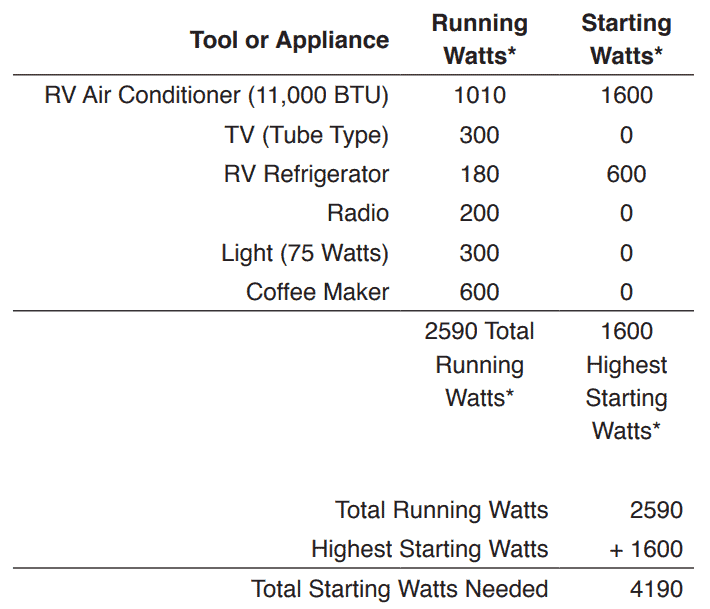
So, once you write down how many watts each appliance uses, you can get a general idea of how many watts you need. The chart below can give a general idea of wattage use and starting apps for various appliances.
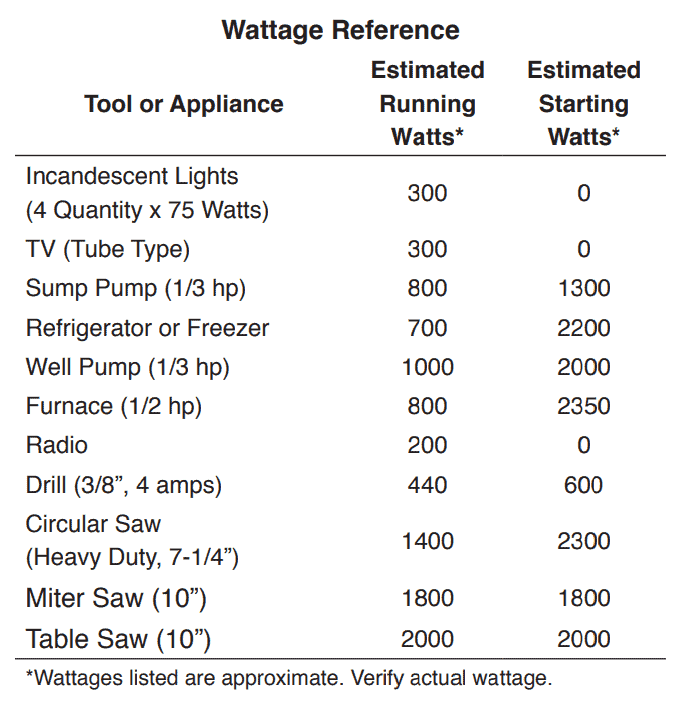
What Are The Benefits Of having An RV Generator?
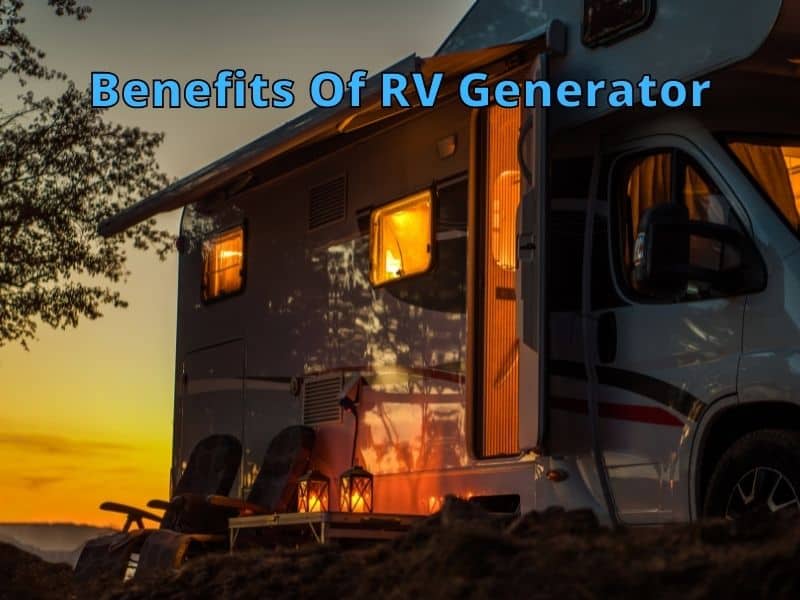
If you have been using an RV for a long time now and if you still do not have a portable generator, you are probably missing some comforts. Some people might think that it is an unnecessary expense, but it can come in handy for many reasons. Why? Here are some things to consider.
1. Generators Are Portable
One reason is that they are relatively lightweight and compact. Weights and sizes have gotten smaller. Many are about 100 lbs, so having one with wheels can save your back. They can be used even when tent camping or the home when the power goes out.
2. Generators Can Keep You Safe
An RV can go into almost any environment. Therefore, it’s a good idea to have power if you need it, especially in emergencies or for lights at night. This will make it easy to see any hazard when working on the RV at night or to recharge a battery, radio, or device if the RV battery is dead.
3. Generators Keep You Entertained
An RV generator will also be vital for entertainment wherever you go. You can set up an outdoor theater. You can play loud music and have a party, provided that such is allowed in your location. You can watch TV or charge your laptop.
4. Generators Make You Feel Comfortable
With an RV generator, you can provide yourself with the power that you need for AC or heating to regulate temperature. Feeling comfortable is important on long trips. From sleeping in your RV to keeping entertained, a generator can provide you with many of the comforts of home.
5. Generators Make Cooking Easy
Cooking at the campsite can make more possibilities available with an RV generator. You can plug in an induction cooker, microwave, or an electric oven and get power from your generator. You can also use electric kettles and grills.
How to Choose An RV Generator
With the abundance of available generators, here are some things to consider before buying a new one.
- Budget: The first thing you have to do is to set a budget. As you look at the different brands and models, be sure to stick to your budget. By knowing how much you can realistically spend, it will be easier to not go overboard.
- Portability: Since you are looking for an RV generator, it is important that it is as lightweight and compact as possible. It must perfectly fit in your RV and you must be able to bring it without difficulty. If possible, settle for a model that has a wheeled design so that you will not have too much difficulty in having it transferred from one place to another.
- Warranty: This is important as it will provide you with peace of mind. Throughout the warranty coverage, the manufacturer will offer free repair or replacement of the parts that are defective. A better choice is an RV generator that comes with a longer warranty coverage.
- Ease of Use: To be user-friendly, one of the essentials would be an electric start. This eliminates the need for pulling or recoil. All that you need is to press a single button and it will start on its own. There are even some with their own remote control.
- Noise: One of the technical specifications that you should look at is the decibel. The higher the number is, the louder the generator will be. A good option is one that operates quietly, which means that it will not cause any disruption, especially when you are sleeping.
- Fuel Tank: Do not also forget to look at the capacity of the fuel of the generator. A larger tank is always the better option since this means that it can provide continuous power for a longer time without the need to refill. However, this also means that the generator will most probably be large and heavy.
- Power: There are different factors that will be indicative of the power of the generator. First, take a look at the engine that it has. Also, consider the horsepower and the wattage that it can deliver. Think about the appliances that will be used to determine the power that you need from a generator.
Conclusion
If I were getting a generator, I would want to check on it regularly, get used to how to operate it well, and ensure the oil levels are correct. Checking the oil every 8 hours seems excessive, but generators operate under many conditions, and that’s one reason manufacturers are concerned about checking it so often.
Making it a routine to check the oil can help you keep your generator running well for long periods because you’ll likely provide regular care for it and be faster at identifying problems when they come up.
Thanks for visiting Drivinglife.net
References
Title Image Credit – https://www.youtube.com/watch?v=gFRjalnWU6k
